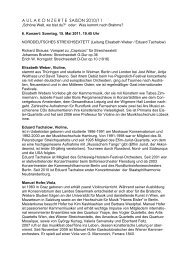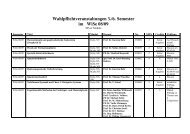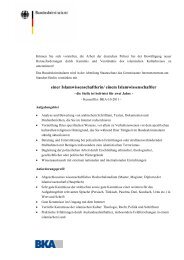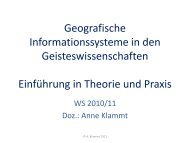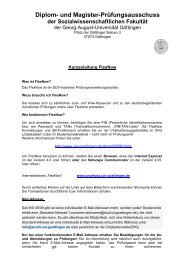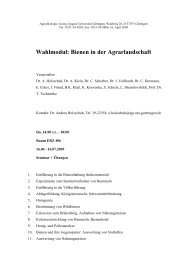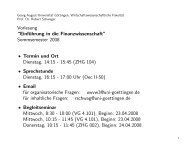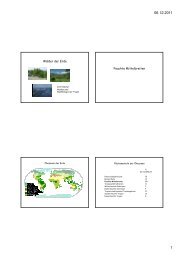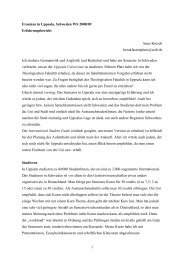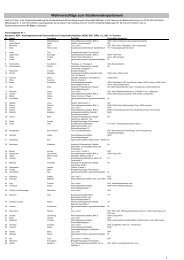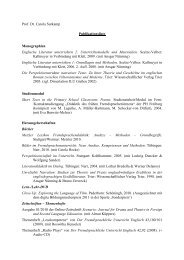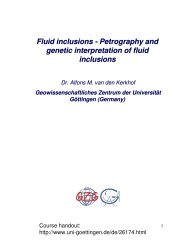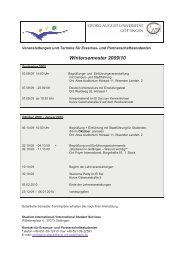The OMC inclusion and national social NGOs: From enthusiasm to ...
The OMC inclusion and national social NGOs: From enthusiasm to ...
The OMC inclusion and national social NGOs: From enthusiasm to ...
You also want an ePaper? Increase the reach of your titles
YUMPU automatically turns print PDFs into web optimized ePapers that Google loves.
found that the consultation process in the framework of the permanent advisory board ratherresembled a gathering where one could give one’s blessing <strong>to</strong> the NAP than real consultation– a view confirmed by an observing researcher 29 -, evaluated by another NGO representativeas “rather anecdotic” 30 . Interestingly, however, the issue of democratic legitimation washardly perceived as problematic. Only one (NGO) interviewee in Germany <strong>and</strong> two in Franceproblematised the absence of the parliament in the process. Other remarks relate <strong>to</strong> the <strong>to</strong>onarrow time frame <strong>and</strong> poor public visibility. <strong>The</strong> lack of engagement of the terri<strong>to</strong>rialauthorities is widely regretted, particularly in Germany, where it is partly attributed <strong>to</strong> a <strong>to</strong>ostrong control of the process by the executive. Overall, federal, regional <strong>and</strong> local levels aswell as the <strong>NGOs</strong> seem <strong>to</strong> agree that it did not have any impact on poverty policies inGermany whereas the answers varied between I could not tell <strong>and</strong> no (impact) in France.<strong>The</strong>se answers are reflected in the official governmental evaluations of this <strong>OMC</strong> in 2005 inwhich the German government states that this <strong>OMC</strong> did not have any impact on policymakingwhereas the French government at least officially welcomes it as an instrument in linewith French <strong>national</strong> <strong>and</strong> European priorities.French interviewees repeatedly found that the process had improved interministerialcoordination, where, so an interviewee, “the <strong>OMC</strong> <strong>inclusion</strong> provided a common frameworkin which the administration <strong>and</strong> <strong>NGOs</strong> could work <strong>to</strong>gether”. In Germany, <strong>and</strong> according <strong>to</strong>several interviewees from <strong>NGOs</strong> <strong>and</strong> the federal <strong>and</strong> the regional levels, the <strong>OMC</strong> <strong>inclusion</strong>has not improved interministerial coordination. <strong>The</strong> respective ac<strong>to</strong>rs explain this bydiverging interests both between the different resorts within a government <strong>and</strong> between theregions <strong>and</strong> the federal government.More on the political side of the coin, ac<strong>to</strong>rs agree that the process has helped <strong>to</strong> keep theissue on the agenda (see also Maucher 2005), that it forces the government <strong>to</strong> draft the report(NAP), that it supports a European discourse on <strong>social</strong> exclusion <strong>and</strong> visualizes “<strong>social</strong>Europe”. Finally, it would force member states <strong>to</strong> engage in processes of comparison,apprehended as a positive development. All these assessments are more or less sharedbetween the interviewees; the only real divide can be found in their evaluation whether the29 If one acknowledges that these meetings take place 1-2 times a year, during four hours of discussion, gatheringup <strong>to</strong> 80 people, <strong>and</strong> that the NAPs are not the only subject treated here, this account may come close <strong>to</strong> thetruth.30 Interview NGO key officer, 2.6.2005.



